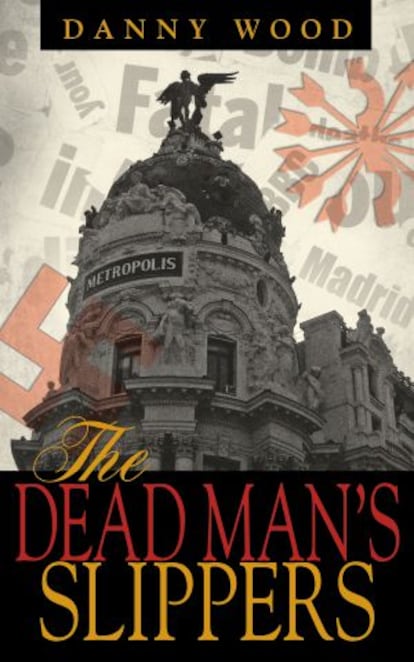A tale emerges from tragedy
Former BBC correspondent Danny Wood has drawn on his experiences in Madrid for his first book The alternate-history novel, titled 'The Dead Man’s Slippers,' uses the 11-M attacks as a plot point

Earlier this month, people all over Spain took a moment to commemorate a painful anniversary. March 11 marked 10 years since an Islamist terrorist cell placed backpacks carrying powerful bombs on Madrid commuter trains, as part of a coordinated attack that killed 191 people and injured thousands more. One of the foreign journalists working in the Spanish capital at the time, Australian-born Danny Wood, happened to be enjoying his breakfast nearby at the time of the tragedy.
“I was in a café on the roundabout at Atocha station, just opposite the Reina Sofía museum,” he explains. “I can remember looking up, probably munching on a croissant, and noticing the TV screens, and they were showing the station. Everyone else in the café started to notice, and when I wandered outside there was already a police cordon up.”
Wood spent that tragic day, and the subsequent weeks, reporting on the atrocity for the BBC, talking to the doctors who dealt with the aftermath, and covering the story when the terrorists, who had been cornered by the police in the satellite town of Leganés, blew themselves up in an apartment building.
Ten years on, and Wood is no longer covering the Spanish news, having made the move with his wife to live near Kansas City in the US. But the attacks form an essential plot point in his first novel, a self-published alternate-history tale titled The Dead Man’s Slippers.
The story revolves around a fascist network that is using genetic engineering to achieve world domination
The story follows Joe Rudd, a character with more than a passing resemblance to the author, being an Australian expat and BBC journalist living in Madrid. But that is the departure point from reality for this novel, whose story revolves around Rudd’s discovery of a secret fascist network that is using genetic engineering in a bid to achieve world domination. The members of the shadowy organization are well aware of the planned bombings in Madrid, and are plotting to use them as an excuse to make a comeback.
As well as his experiences during the fated month of March 2004, Wood drew inspiration from his apartment-hunting trips in the Spanish capital.
“I was looking for somewhere to buy,” he explains. “I was shown this apartment that was full of all this old man’s stuff – it was as if he’d just gone out for a coffee and hadn’t come back. There were clothes in the washing machine, plates in the sink, the cupboards were full, the beds all had sheets on them still… The novel is based on chasing the person who owns that apartment and imagining them to be a dark fascist hero from the past, who’s coming back to conspire against modern-day Spain.”

Wood – who is 44 and originally from Newcastle, near Sydney, Australia – chose the theme partly because of a feeling that the ghosts of the past were never far from day-to-day discourse in Spain. “You often feel like this recent history, the Franco dictatorship, is hovering in the background, and it is always food for an interesting conversation with Spanish people,” he explains. “It’s also one of those topics that is always of interest to the foreign desk. The only stories you hear involving Australia in the news are about sharks, poisonous spiders and alligator attacks. With Spain it’s fascists, flamenco dancers and bullfights. It’s in your head all the time. But unlike Germany and Italy, Spain didn’t get rid of its fascists until very recently. That makes for a very interesting background for a story like this.”
But the choice of the 11-M attacks as a plot point for the story could be seen as a little risky. Was Wood concerned that it might be too early for Spain’s worst terrorist atrocity to be used in such a way? “I didn’t want to be seen to be taking advantage of these terrible attacks,” he explains. “But I guess by the same token I did feel like I was there at the time – I talked to a lot of people, and I feel like I have some justification, because I was reporting on it.”
You often feel like the recent history of the Franco dictatorship is hovering in the background"
Wood left Spain in 2009, after spending seven years in Madrid working as a stringer. “It seems a long time ago now,” he explains. “I loved my time there, but I was ready to leave. I was lucky to go when I did: I got there in 2002, and [soccer player] David Beckham turned up shortly afterwards. Then there was the tragedy of the bomb attacks, and Spain started digging up the Civil War graves... There was a lot of journalism to be done for a foreign correspondent in Madrid.”
And the apartment in Madrid that was left empty by the old man? Wood ended up buying it, still filled as it was with the belongings of a recently deceased nonagenarian. Despite living thousands of miles away, he still owns the property, renting it out via the help of a friend. It was a purchase, then, that served him well – not least in terms of inspiration, which, it seems, can come from the most unexpected of places.
The Dead Man’s Slippers is available via the Kindle store on Amazon. Click here for more information.
Tu suscripción se está usando en otro dispositivo
¿Quieres añadir otro usuario a tu suscripción?
Si continúas leyendo en este dispositivo, no se podrá leer en el otro.
FlechaTu suscripción se está usando en otro dispositivo y solo puedes acceder a EL PAÍS desde un dispositivo a la vez.
Si quieres compartir tu cuenta, cambia tu suscripción a la modalidad Premium, así podrás añadir otro usuario. Cada uno accederá con su propia cuenta de email, lo que os permitirá personalizar vuestra experiencia en EL PAÍS.
¿Tienes una suscripción de empresa? Accede aquí para contratar más cuentas.
En el caso de no saber quién está usando tu cuenta, te recomendamos cambiar tu contraseña aquí.
Si decides continuar compartiendo tu cuenta, este mensaje se mostrará en tu dispositivo y en el de la otra persona que está usando tu cuenta de forma indefinida, afectando a tu experiencia de lectura. Puedes consultar aquí los términos y condiciones de la suscripción digital.









































